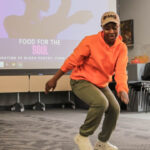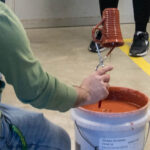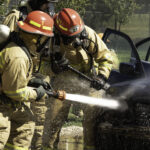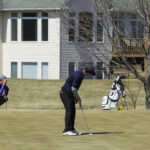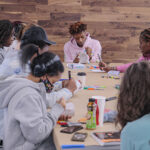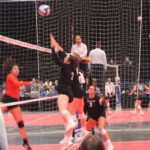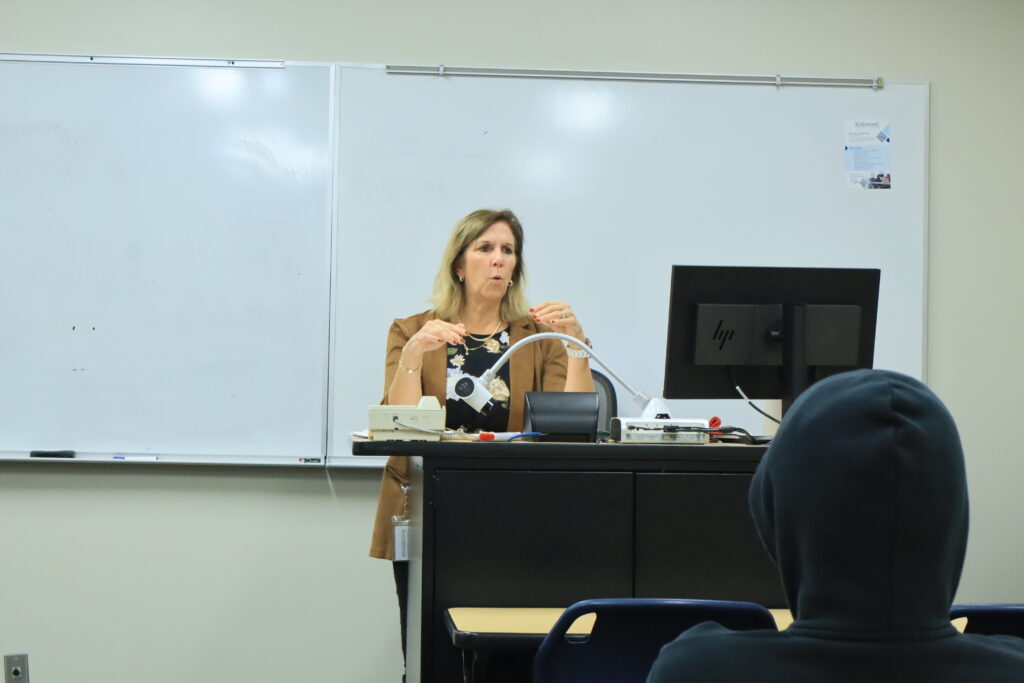
Once the Director of the Kirkwood Community College Jones County Regional Center, Lisa Folken now teaches Fundamentals of Oral Communications and Public Speaking at the Cedar Rapids campus.
She has been with Kirkwood since 2005 and retired into a lesser role with the college in order to spend more time with her family.
What led to you teaching?
I was an administrator at Kirkwood Jones Regional for about 12 years and during that time I was really missing a lot of the student connection. As an administrator you just focus on different things and so I started doing a little bit of teaching and realized that I was really loving it. It helped me better understand and connect to students and faculty. Somewhere along the way, I decided that I wanted to do some additional teaching, so I went back and got a second master’s in communications because that was a love of mine.
The other reason I chose communications is because I’ve seen a lot of barriers for students graduating because of tremendous fear. For most people it’s either math or speech. I wanted to be part of the solution in helping students thrive through that. I started my master’s back in 2019 with the intention of this being my retirement gig to teach part-time as an adjunct after I retired. Then me doing part-time admissions work is the icing on the cake because I get to have additional impact and one-on-one support for students.
How do you help students overcome fear of public speaking?
It’s not easy because fear is always there and for some people they’ll never be comfortable talking in front of people. It’s about not overcoming that fear, but recognizing it and knowing what to do with it. I try to make it a comfortable environment, very approachable, and build relationships. That helps alleviate some of the fear and hopefully students can overcome it and complete the class.
How has your time as an administrator at the Jones County Regional Center impacted your teaching?
When I first started teaching, I wondered how I was going to do this because I wasn’t a traditional teacher. At Kirkwood, by becoming the expert in a field, that’s where you’re credentialed to teach.
I think a lot of my work as an administrator carried over. I tend to over communicate and am very transparent. Working with students and understanding differences comes naturally to me, but I try to respect that it doesn’t for everyone. I think practicing transparency, understanding, and making a connection is really the foundation of who I am. I call it the art of connection—being intentional about who you surround yourself with and who brings out the best in you and others.
You were a D1 athlete. What experiences and skills has being an athlete translated into your career here at Kirkwood?
When I was considering colleges, I was focused on swimming and scholarships. When I got to college, I learned a lot about myself and what I needed to do to be successful. My grades weren’t great my first semester, so I had to figure out how to change that.
Through that, I learned a lot about helping other students. I consider students a lot like icebergs—many bring things to school we don’t see. We can’t fully understand people unless we build relationships with them. That helped me with a greater understanding of students and faculty.
It really helped me focus on my overall mission when I became an administrator—to inspire people to be the best versions of themselves, whether that’s students, faculty, or my team. I’m able to take all those different lenses I’ve had—working with at-risk populations, faculty, teams, and students—and understand barriers while building connections. Making those connections is instrumental.
Did your early academic struggle make you more understanding of students?
I would say so. In high school I graduated with honors, but college is different. As a D1 athlete, you’re balancing travel, practices, and school. I think that’s important to understand—many students are balancing full-time jobs or family responsibilities. I try to be open-minded first rather than quickly going to judgment.
You’ve mentioned your family is extremely important to you. How has your family influenced your career?
As my positions evolved at Kirkwood, I often say there are people who aspire to go into leadership and others who are chosen. I felt like I was in that second camp. I wasn’t pursuing leadership when my kids were little, but as opportunities came up, I embraced them, even while doubting myself.
After my first master’s in administration, I said I was done, but I started teaching a class called How College Works and loved it so much that I went back for a second master’s in communications. My kids played a big role because when they were little, I wasn’t looking for a big commitment. As they grew, they were super supportive. They’ve certainly been an inspiration.
What advice do you have for students early in their Kirkwood career?
I encourage students to take a speech or writing class early on because that helps in everything they do. Take communications and English first. The college also encourages students to take math early since it can be a barrier.
Don’t take on too much. It’s more about balance—figuring out what you can manage with family, work, and academics. We’d rather have you take fewer classes and be successful than take too much and fail. Persistence and retention are super important because we want you to graduate.
Kirkwood does a really good job with student services. There are so many supports that can help students be successful. Sometimes students don’t know what’s available—it’s our job to help them connect those dots.
If you’re direct from high school, it’s okay not to have all the answers. I went to college to swim and didn’t know what I wanted to do. It’s okay to explore and figure it out. We have career services and lots of people who can help. If I had to do it over again, I would have gone to Kirkwood. It would have been better for me to figure things out.
Is there anything else you’d like students to know?
I just love working with people. I get my energy from people. One of my top strengths is WOO—winning over others—but it’s really about connecting. I think if students give faculty a chance to get to know them, they will. Once we break down those walls, students are far more successful in and out of the classroom.
Thinking about retirement, being an adjunct isn’t easy—it’s a lot of work—but to me, it’s all worth it.
Working in admissions has been a great surprise. I love that team and love working with students considering Kirkwood. I can share the Kirkwood story, show how much we care, and help them figure out their best path. A lot of times they think they have it figured out, and it’s not about changing their mind, but asking, “Why are you interested in this and how can we help you get there?” If they don’t know their why, it’s tougher to have them complete their program.
Categories: Feature

